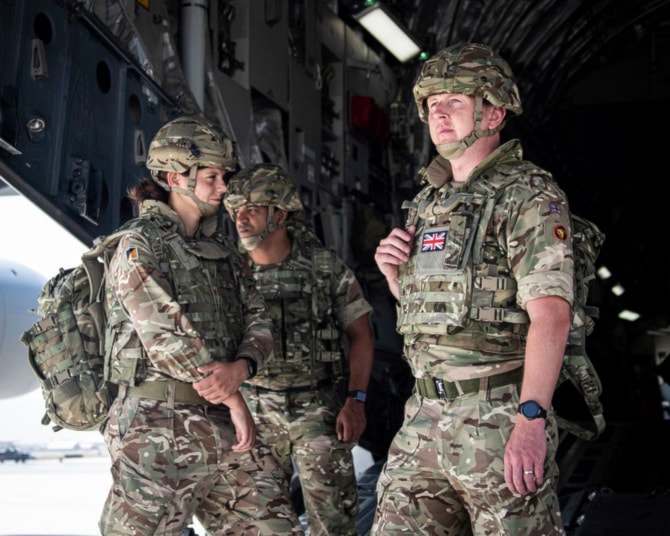UK SAS blocked resettlement apps from elite Afghan troops: BBC
The Ministry of Defense says it has initiated an independent review of the accusations.
-

Members of the 16 Air Assault Brigade arrive in Kabul as part of a UK-force sent to assist with Operation PITTING to rescue British nationals in Afghanistan. (AP)
UK Special Forces prevented Afghan servicemen who have fought along their side from moving to the UK when the Taliban took power, despite applications containing convincing proof of service with the British military, BBC Panorama reported.
The Ministry of Defense stated that it was undertaking an independent review.
Used and left behind
When the Taliban took control in August 2021, members of Afghan Special Forces, units CF 333 and ATF 444 - known as the "Triples" - were threatened for assisting UK Special Forces in their invasion. They were entitled to apply for relocation to the UK under the Afghan Relocation and Assistance Policy (Arap) initiative, however, hundreds of their applications were denied.
BBC Panorama obtained a Standard Operating Procedures (SOP) document that shows that since at least 2023, all Triples applications that met a basic requirement have been referred to UK Special Forces for approval or refusal of sponsorship.
The SOP document, obtained by investigative journalism Lighthouse Reports and shared with Panorama, demonstrates that if UK Special Forces declined sponsorship, the application was immediately ruled ineligible and a rejection letter was delivered.
Panorama also obtained internal Ministry of Defense communications in which civil staff overseeing the relocation project describe being unable to contest Special Forces rejections, despite believing there was a compelling case for resettlement.
Former SAS troops have told Panorama that they feel the veto contained in the SOP paper indicates a blatant conflict of interest for the UK's Special Forces, granting them authority over applications at a time when SAS forces were accused of war crimes in Afghanistan when Triples units were present.
The public inquiry can compel witnesses who are in the UK, but not non-UK nationals who are abroad. If Afghan Special Forces troops were in the UK, they may be pressed to offer potentially important evidence.
A former UK Special Forces officer told the BBC that "at best it's not appropriate, at worst it looks like they're trying to cover their tracks."
Panorama met with two former Triples members who had their transfer petitions refused in 2023 and claimed to have observed or denounced war crimes perpetrated by UK Special Forces.
Betrayed and forgotten
Their applications contain various documents such as formal invitation letters to the UK, letters from the British embassy regarding salaries, photos with directors of the UK Special Forces and British Ambassador, and previous visas along with letters from UK officers confirming their role in Afghanistan.
Both were denied their applications, and they reported to Panorama having to hide in Afghanistan due to their former role.
One described how he felt all the sacrifices he made had been "forgotten".
"I feel I have been left alone in the midst of hell."
Erin Alcock, a lawyer at Leigh Day, described that there was a spike in applications rejected for Triples "despite providing ample evidence of their work with the UK Special Forces in Afghanistan."
She speculated that the applications were rejected under what seems to be a "blanket policy".
The Armed Forces Minister, James Heappey, claimed that the applications were denied because the government did not keep employment or payment records the way they did for other applicants, a claim that military figures dismissed as untrue, citing that Afghan forces were directly paid by the UK with proper records.
A former officer even reported seeing spreadsheets, citing that their forces were "on the ground most days for 20 years."
UK Special Forces have previously been accused of impeding military investigators from asking Afghan partner units about the SAS' war crimes.
Former senior Royal Military Police (RMP) investigators told the BBC that special forces leadership routinely prevented them from meeting Afghan troops throughout their investigations between 2012 and 2019.
The RMP formally requested that the military prosecutor charge a high-ranking UK Special Forces officer with corrupting the course of justice in 2014 after he ended an interview with an Afghan soldier about accusations of war crimes.

 4 Min Read
4 Min Read










